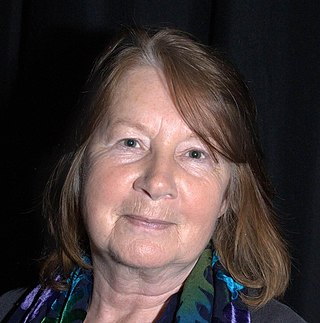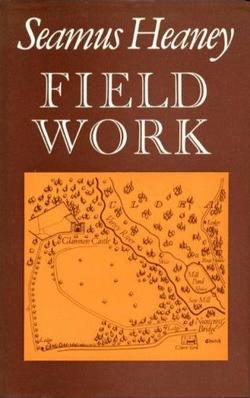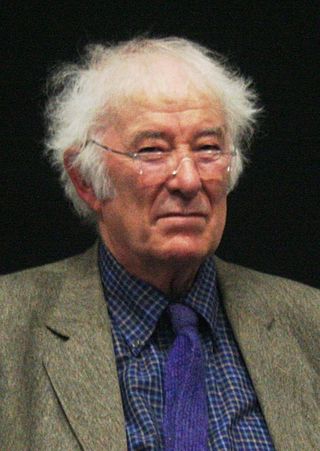
Seamus Justin Heaney was an Irish poet, playwright and translator. He received the 1995 Nobel Prize in Literature. Among his best-known works is Death of a Naturalist (1966), his first major published volume. Heaney was and is still recognised as one of the principal contributors to poetry in Ireland during his lifetime. American poet Robert Lowell described him as "the most important Irish poet since Yeats", and many others, including the academic John Sutherland, have said that he was "the greatest poet of our age". Robert Pinsky has stated that "with his wonderful gift of eye and ear Heaney has the gift of the story-teller." Upon his death in 2013, The Independent described him as "probably the best-known poet in the world".
British Poetry since 1945 is a poetry anthology edited by Edward Lucie-Smith, first published in 1970 by Penguin Books. The anthology is a careful attempt to take account of the whole span of post-war British poetry including poets from The Group, a London-centred workshop for whom Lucie-Smith himself had once been chairman.

Philip Blake Morrison FRSL is an English poet and author who has published in a wide range of fiction and non-fiction genres. His greatest success came with the publication of his memoirs And When Did You Last See Your Father?, which won the J. R. Ackerley Prize for Autobiography. He has also written a study of the murder of James Bulger, As If. Since 2003, Morrison has been Professor of Creative and Life Writing at Goldsmiths College, University of London. He is a Fellow of the Royal Society of Literature.
The Field Day Theatre Company began as an artistic collaboration between playwright Brian Friel and actor Stephen Rea. In 1980, the duo set out to launch a production of Friel's recently completed play, Translations. They decided to rehearse and premiere the play in Derry with the hope of establishing a major theatre company for Northern Ireland. The production and performance of Translations generated a level of excitement and anticipation that unified, if only for a short time, the various factions of a divided community.
Seamus Francis Deane was an Irish poet, novelist, critic, and intellectual historian. He was noted for his debut novel, Reading in the Dark, which won several literary awards and was nominated for the Booker Prize in 1996.

Death of a Naturalist (1966) is a collection of poems written by Seamus Heaney, who received the 1995 Nobel Prize in Literature. The collection was Heaney's first major published volume, and includes ideas that he had presented at meetings of The Belfast Group. Death of a Naturalist won the Cholmondeley Award, the Gregory Award, the Somerset Maugham Award, and the Geoffrey Faber Memorial Prize.

The Assessment and Qualifications Alliance has produced Anthologies for GCSE English and English Literature studied in English schools. This follows on from AQA's predecessor organisations; Northern Examinations and Assessment Board (NEAB) and Southern Examining Group (SEG).

Medbh McGuckian is a poet from Northern Ireland.

District and Circle is a poetry collection by Seamus Heaney, who received the 1995 Nobel Prize in Literature. It was published in 2006 and won the 2006 T. S. Eliot Prize, the most prestigious poetry award in the UK. The collection also won the Irish Times "Poetry Now Award".
Bernard O'Donoghue FRSL is a contemporary Irish poet and academic.

Field Work (1979) is the fifth poetry collection by Seamus Heaney, who received the 1995 Nobel Prize in Literature.
Greg Delanty is an Irish poet. An issue of the British magazine, Agenda, was dedicated to him.

George McWhirter is an Irish-Canadian writer, translator, editor, teacher and Vancouver's first Poet Laureate.
Dennis O'Driscoll was an Irish poet, essayist, critic and editor. Regarded as one of the best European poets of his time, Eileen Battersby considered him "the lyric equivalent of William Trevor" and a better poet "by far" than Raymond Carver. Gerard Smyth regarded him as "one of poetry's true champions and certainly its most prodigious archivist". His book on Seamus Heaney is regarded as the definitive biography of the Nobel laureate.

Human Chain (2010) is the twelfth and final poetry collection by Seamus Heaney, who received the 1995 Nobel Prize in Literature. It won the Forward Poetry Prize Best Collection 2010 award, the Irish Times Poetry Now Award for 2011, and was shortlisted for the 2011 Griffin Poetry Prize. This was Heaney's second Poetry Now Award, having previously won in 2007 for District and Circle.

That part of the United Kingdom called Northern Ireland was created in 1922, with the partition of the island of Ireland. The majority of the population of Northern Ireland wanted to remain within the United Kingdom. Most of these were the Protestant descendants of colonists from Great Britain.
Kevin Kiely is a poet, critic, author and playwright whose writings and public statements have met with controversy and also with support.
Malika Booker is a British writer, poet and multi-disciplinary artist, who is considered "a pioneer of the present spoken word movement" in the UK. Her writing spans different genres of storytelling, including poetry, theatre, monologue, installation and education, and her work has appeared widely in journals and anthologies. Organizations for which she has worked include Arts Council England, the BBC, British Council, Wellcome Trust, National Theatre, Royal Shakespeare Company, Arvon, and Hampton Court Palace.

Beowulf: A New Verse Translation is a verse translation of the Old English epic poem Beowulf into modern English by the Irish poet and playwright Seamus Heaney. It was published in 1999 by Farrar, Straus, and Giroux and Faber and Faber, and won that year's Whitbread Book of the Year Award.

The 1995 Nobel Prize in Literature was awarded to the Irish poet Seamus Heaney (1939–2013) "for works of lyrical beauty and ethical depth, which exalt everyday miracles and the living past." He is the fourth Irish Nobel laureate after the playwright Samuel Beckett in 1969.











